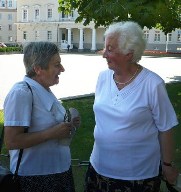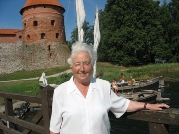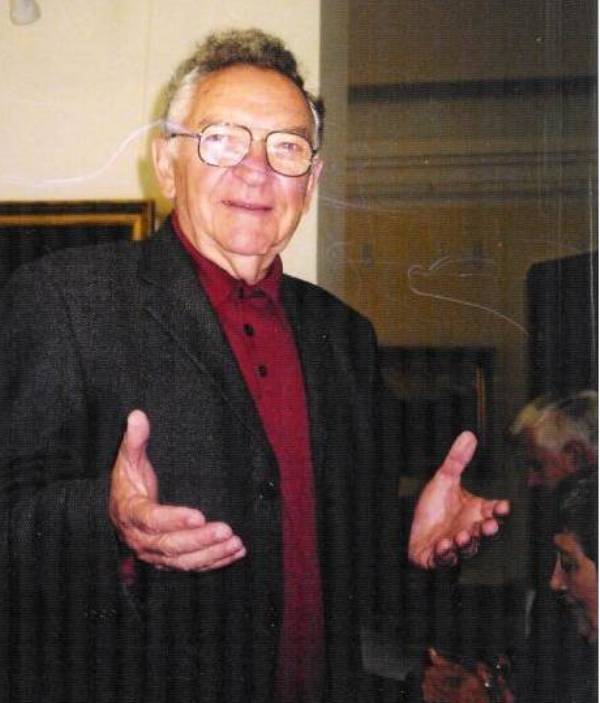 marked three years to the day since police in Vilnius came looking for Holocaust Survivors Dr Rachel Margolis (born 1921, at right of photo) and Fania Yocheles Brantsovsky (born 1922) in a ‘war crimes investigation’ that has still not been publicly closed.
marked three years to the day since police in Vilnius came looking for Holocaust Survivors Dr Rachel Margolis (born 1921, at right of photo) and Fania Yocheles Brantsovsky (born 1922) in a ‘war crimes investigation’ that has still not been publicly closed.
Both women were incarcerated in the Vilna Ghetto from 1941 to 1943. Both lost their entire families to the barbarity of the Nazis and their local collaborators. They both escaped, on different days in September 1943, to join up with the anti-Nazi partisans in the forests of Lithuania. The underground forest fort, a half-hour’s drive from Vilnius, the Lithuanian capital, where Fania lived with another hundred or so Jewish escapees of the Vilna Ghetto, is being allowed to sink into the ground and disappear from history’s view.

Fania Yocheles Brantsovsky (left) with Rachel Margolis on Cathedral Square in central Vilnius
In a poignant co-occurrence of dates, the 1000 day milestone fell in 2011 during Holocaust Remembrance Week in late January, and just two days after Holocaust Remembrance Day, the designated day of commemoration of the liberation of the Auschwitz concentration camp on 27 January 1945, by Soviet troops, in alliance with the United States, Great Britain and the other Allies.
And the May 5th three-year mark coincideed with the week of Holocaust remembrance initiated by Yom Hashoah which fell this year on 2 May 2011 in the general calendar.
United States congressmen continue to wait for a meaningful reply to their December 2009 letter to Lithuania’s leaders. Considerable international concern has been expressed over the sad affair. In its own statement of protest, the Jewish Community of Lithuania pinpointed what it considers to be the antisemitic aspects of the prosecutors’ project.
Britain’s former prime minister, Gordon Brown, recently made Rachel Margolis the focus of one of his series of articles on courageous women of our times.
By sad contrast, the Lithuanian Human Rights (!) Association (the LHRA) in December 2010 released a statement calling for the ‘sentencing’ of these Holocaust Survivors, including Dr Margolis, for ‘organizing a massive slaughter’. Mainstream media outlets have continued throughout to defame the two women, often repeating Lithuanian prosecutors’ assertions that ‘their place of residence could not be found yet’, a nonsense for which the prosecution service has still not had the grace to apologise. More details here.
The state-sponsored harassment and defamation of Holocaust Survivors in Lithuania is widely seen as part of the larger effort to rewrite history, locally to delete the Holocaust as unique category (without denying a single death), and to use massive government funding to support dissemination of the revisionist ‘Double Genocide’ paradigm throughout the European Union. This is part of the Holocaust Obfuscation campaign that seeks to blur the overwhelming participation of locals in the Baltic Holocaust. The percentages of Jews killed in Lithuania, Latvia and Estonia — in the 90s — are the highest in all of Europe. For samples of the international opposition to the ‘Double Genocide’ movement, see here and here.
 Dr Margolis, now in Rechovot, Israel, feels unable to return to her native Vilnius. She turned 89 on October 28th 2010, and was pleased to receive birthday greetings from the French and Norwegian ambassadors in Vilnius. This photo is from her last summer in Lithuania in 2007, during a day trip to Trakai (Trok). Some sources believe she was targeted by the ‘Double Genocide’ industry for one of her major achievements in Holocaust studies: she rediscovered and painstakingly transcribed and published the lost diary of Polish Christian eyewitness to the murders at Ponar (Paneriai), Kazimierz Sakowicz. It appeared in the original Polish in 1999. In 2005, Yale University Press issued the English edition under the title Ponary Diary. Since the shameful campaign against her was started by Lithuanian prosecutors, Dr Margolis has been honored by the British House of Lords, among many other bodies abroad. Within Lithuania, there has been virtually no mention of her, not even for her forty years’ contribution as biology researcher at Vilnius University.
Dr Margolis, now in Rechovot, Israel, feels unable to return to her native Vilnius. She turned 89 on October 28th 2010, and was pleased to receive birthday greetings from the French and Norwegian ambassadors in Vilnius. This photo is from her last summer in Lithuania in 2007, during a day trip to Trakai (Trok). Some sources believe she was targeted by the ‘Double Genocide’ industry for one of her major achievements in Holocaust studies: she rediscovered and painstakingly transcribed and published the lost diary of Polish Christian eyewitness to the murders at Ponar (Paneriai), Kazimierz Sakowicz. It appeared in the original Polish in 1999. In 2005, Yale University Press issued the English edition under the title Ponary Diary. Since the shameful campaign against her was started by Lithuanian prosecutors, Dr Margolis has been honored by the British House of Lords, among many other bodies abroad. Within Lithuania, there has been virtually no mention of her, not even for her forty years’ contribution as biology researcher at Vilnius University.
The two women, heroic veterans of the Jewish partisans’ resistance against the Nazis, have neither been charged nor cleared (though repeatedly defamed in mainstream media), in a macabre campaign of prosecutors to generate a bogus paper trail to defame the anti-Nazi resistance, as part of a wider ‘Blame the victims’ campaign to obfuscate the Holocaust.

Dr Yitzhak Arad (Vilnius, 2001)
The shambolic affair started earlier, in spring 2006, when prosecutors opened a ‘pre-trial investigation’ into Dr Yitzhak Arad — Holocaust survivor, anti-Nazi partisan veteran, hero of the Israeli War of Independence (1948), Holocaust scholar and founding director of Yad Vashem. Under massive international pressure, part of that kangaroo efforts was dropped in September 2008, in an insulting statement in which prosecutors attacked one of his books, citing an anonymous ‘expert historian’ who has yet to be identified — one of the state’s cowardly ‘historians for hire’. Unmasking the shadowy, on-the-make academics who cooperate anonymously with antisemitic officials is an issue that is attracting growing attention.
‘During investigation the conclusions by the Doctor of Humanitarian Sciences (expert-historian) we received indicating that in his book Y. Arad just like other Soviet partisans gave prominence to the activities of his own, left factual mistakes. Moreover, during pre-trial investigation further stories of persons who were allegedly involved in the criminal act together with Y. Arad was not established.’
In the same incredible statement, the hard to believe turns to what appears to be the shameless incredible. They announced that:
‘Prosecutor General’s Office requests the society for assistance. People who can give evidence or have important information […] are requested to provide such information to the Special Investigations Division, Prosecutor General’s Office of the Republic of Lithuania.’
It is widely considered unbeneficial to Lithuania’s reputation internationally, that the campaign against Holocaust Survivors in the country with the highest percentage of Jewish victims in Europe is being led by its prosecution service, which has one of the world’s worst records in pursuing justice for alleged Nazi war criminals. The country has earned a failing grade in that regard from the Simon Wiesenthal Center. To add salt to the wounds by then pursuing Jewish survivors, without the slightest shred of evidence of wrongdoing during their time among the anti-Nazi partisans, is what led the Economist in London in 2008 to refer to the shambolic episode as Blaming the Victims.
There has still not been a word of public criticism of the prosecutors’ anti-Jewish campaign from the ‘Red-Brown Commission’ which Dr Arad had been persuaded to join in the late 1990s. The Commission is an active supporter of the 2008 Prague Declaration, that would write the Holocaust out of European history, replacing it with the ultranationalists’ ‘Double Genocide’ politics.